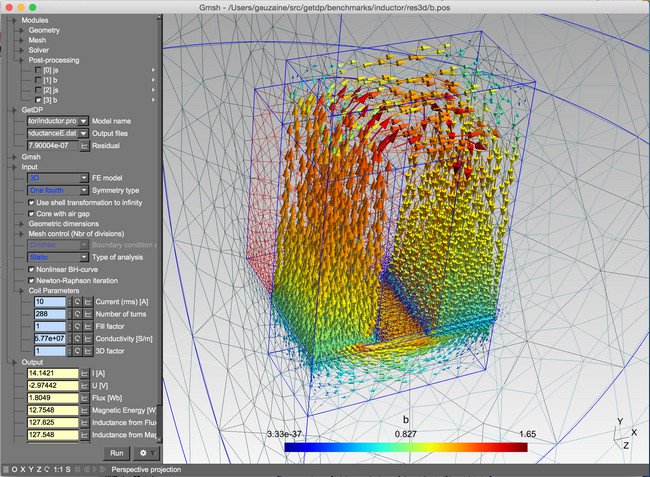File Size: 52.85 MB
Gmsh is a powerful 3D finite element mesh generator with a built-in CAD engine and post-processor. Its design goal is to provide a fast, light and user-friendly meshing tool with parametric input and advanced visualization capabilities. Gmsh is built around four modules: geometry, mesh, solver and post-processing. The specification of any input to these modules is done either interactively using the graphical user interface, in ASCII text files using Gmsh's own scripting language (.geo files), or using the C++, C, Python or Julia API.
No installation necessary
As there is no setup pack involved, you can drop the program files in any part of the hard disk and just click the executable to launch Gmsh. There is also the option to save it to a removable storage unit, like a USB flash disk, in order to run it on any PC effortlessly and without any other installers.
What's more, the utility does not modify Windows registry settings or create additional files on the disk without permission, thus leaving it clean after removal.
Clear-cut interface and intuitive options
The interface is user-friendly, based on a classical-looking window split into two panels, for activating modules and for viewing the generated 3D mesh, respectively.
Rich plethora of options for creating and saving 3D mesh files
The modules are split into three major categories: geometry, mesh and solver. Therefore, you can use elementary entities (e.g. add, translate, rotate, scale), physical groups (coherence, reload, edit file), define one, two and three dimensions, as well as run GetDP to solve elements.
The project can be saved with the GEO file extension. It is possible to merge multiple mesh files, watch patterns, use Gmsh remotely on another computer, as well as save the model options. Numerous plugins are supported and can be used to enhance 3D meshes with crack, curl, bubble, streamline, skin, triangulation, transformation, and other types of effects.
Evaluation and conclusion
The tool does not put a strain on computer performance, since it runs on low CPU and RAM. It has a good response time to commands and works smoothly, without causing Windows to hang, crash or pop up error messages.
All in all, Gmsh is a resourceful piece of software for creating, designing and generating 3D mesh files, backed by rich configuration settings.Whats New:Added support for creating MED files with specific MED (minor) version; small bug fixes.
Renumber mesh nodes/elements by default; small bug fixes
New C++, C, Python and Julia API
New MSH4 format
New mesh partitioning code based on Metis 5
New 3D tetrahedralization algorithm as default
New workflow for remeshing (compound entities as meshing constraints, CreateGeometry for mesh reparametrization)
Added support for general b-splines, fillets and chamfers with OpenCASCADE kernel
Improved meshing of surfaces with singular parametrizations (spheres, etc.) uniformized entity naming conventions (line/curve, vertex/node, etc.)
Generalized handling of "all" entities in geo file (using {:} notation)
Added support for creating LSDYNA mesh files
Removed old CAD creation factory (GModelFactory), old reparametrization code (G{Edge, Face, Region}Compound) and old partitionning code (Metis 4 and Chaco)
Various cleanups, bug fixes and enhancements.
https://www.file-upload.com/psbvpra6wl7m
 |
 |
 |
 |
 |
 |
 |
 |
 |
 |
 |
 |
 |
 |
 |
เว็บไซต์เราจะอยู่ไม่ได้หากขาดเขาเหล่านี้ รวมช่วยกันสนับสนุนสปอนเซอร์ของพวกเรา
กำลังแสดงผล 1 ถึง 1 จากทั้งหมด 1
-
20th October 2018 18:31 #1ชอบโพสต์เป็นชีวิตจิตใจ

- วันที่สมัคร
- Jun 2016
- กระทู้
- 2,299
- กล่าวขอบคุณ
- 0
- ได้รับคำขอบคุณ: 95
[Direct Links] Portable Gmsh 4.0.4 (x86/x64)














 ตอบพร้อมอ้างถึงข้อความเดิม
ตอบพร้อมอ้างถึงข้อความเดิม
